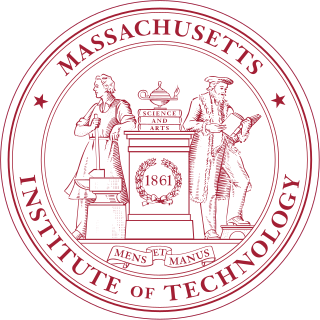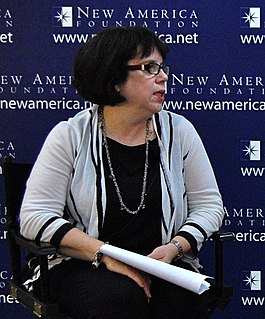
Massachusetts Institute of Technology (MIT) is a private land-grant research university in Cambridge, Massachusetts. Established in 1861, the institute has since played a key role in the development of modern science, engineering, mathematics, and technology, and ranks among the most prestigious academic institutions in the world.
The Nieman Foundation for Journalism at Harvard University awards multiple types of fellowships.

Deborah Blum is an American journalist and the director of the Knight Science Journalism program at the Massachusetts Institute of Technology. She is author of books including The Poisoner's Handbook (2010) and The Poison Squad (2018), and has been a columnist for The New York Times and a blogger for Wired.
The Institute for Citizens & Scholars, formerly known as the Woodrow Wilson National Fellowship Foundation, is a private non-profit operating foundation based in Princeton, New Jersey. It administers programs that support leadership development and build organizational capacity in education. Its current signature program is the Woodrow Wilson Teaching Fellowship. Fellowships are granted to develop human resources, improve public policy, and help different organizations and institutions in enhancing practice in the United States as well as other countries worldwide.
Robin Marantz Henig is a freelance science writer, and contributor to the New York Times Magazine. Her articles have appeared in Scientific American, Seed, Discover and women's magazines. She writes book reviews and occasional essays for the Washington Post, as well as articles for The New York Times science section, op-ed page, and Book Review.
All in the Mind is a weekly Australian Broadcasting Corporation Radio National program, exploring the mind, brain and behaviour. As of 2021 it is hosted by journalist and podcaster Sana Qadar.
Philip S. Khoury is Ford International Professor of History and Associate Provost at the Massachusetts Institute of Technology (MIT). He is also Chairman of the Board of Trustees of the American University of Beirut.
The National Science Foundation Graduate Research Fellowship Program (NSF-GRFP) is a prestigious grant awarded annually by the National Science Foundation to approximately 2,000 students pursuing research-based Master's and doctoral degrees in the natural, social, and engineering sciences at US institutions. As of 2019 the fellowship provides an honorarium of $12,000 to be placed towards the cost of tuition and fees at the university the fellow attends; it also awards the student directly with an annual $34,000 stipend for three years leading to an anticipated award amount of $138k. Each recipient could previously apply for a one time only travel award for $1,000. This travel award was previously for international research activities or presenting at an international scientific conference. However, in 2010, this opportunity was converted to the Nordic Research Opportunity, which is intended to facilitate collaborations between U.S. graduate fellows and scholars at Finnish, Swedish, Danish, and Norwegian research institutions.
The MIT School of Humanities, Arts, and Social Sciences (SHASS) is one of the five schools of the Massachusetts Institute of Technology, located in Cambridge, Massachusetts, US. The school has over 20 departments, department-level programs, and faculties granting SB, SM, and PhD degrees. Major fields of study include anthropology, comparative media studies, economics, history, linguistics, literature, music, philosophy, political science, and theater arts. Other programs include the Center for International Studies; Knight Science Journalism; Science, Technology, and Society; Security Studies; and HyperStudio.
The Stanton Foundation is a private foundation established by Frank Stanton, a long-time president of Columbia Broadcasting System ("CBS"). The Foundation focuses primarily on three areas in which Stanton was unable to complete his philanthropic plans within his lifetime: (1) supporting the First Amendment and creating a more informed citizenry, particularly in regard to civic issues, (2) supporting policy research in international security, with special emphasis on nuclear security and (3) advancing canine welfare. The Stanton Foundation is primarily a "no unsolicited proposals" foundation, although it operates several open application programs as detailed on its website.
Thomas Zeller Jr. is an American journalist who has covered poverty, technology, energy policy and the environment, among other topics, for a variety of publications, including 12 years on staff as a writer and editor at The New York Times. He has also held staff positions at National Geographic Magazine and The Huffington Post.
The Robert Bosch Foundation Fellowship Program was established in 1984 to promote closer US-German ties. It is fully funded by the Robert Bosch Foundation, one of the largest foundations in Germany.
David P. Ropeik is an international consultant, author, teacher, and speaker on risk perception and risk communication. He is also creator and director of Improving Media Coverage of Risk, a training program for journalists. He is a regular contributor to Big Think, Psychology Today, Cognoscenti, and the Huffington Post.
The John S. Knight Journalism Fellowships at Stanford is a paid 10-month journalism fellowship at Stanford University. It is one of 20 such programs available in the US for working journalists. It is connected to the School of Humanities and Sciences.
Geneva Overholser is a journalism consultant and adviser. A former editor of the Des Moines Register now living in New York City, Overholser speaks and writes about the future of journalism. She advises numerous organizations, including the Trust Project, Report for America, SciLine, the Democracy Fund and the Public Face of Science project at the Academy of American Arts and Sciences. She serves on the boards of the Rita Allen Foundation, Northwestern University in Qatar and the CUNY Graduate School of Journalism Foundation.
The Knight-Wallace Fellowship is an award given to accomplished journalists at the University of Michigan. Knight-Wallace Fellowships are awarded to reporters, editors, photographers, producers, editorial writers and cartoonists, with at least five years of full-time, professional experience in the news media.

Faye Flam is an American journalist. She has written for Science Magazine and wrote two weekly columns for The Philadelphia Inquirer, including one on sex and one on evolution. Flam wrote a book on the influence of sex on human evolution and society. She teaches science writing and lectures on communication to scientific forums, and is a journalism critic for the MIT Knight Science Journalism Tracker.
Undark Magazine is a non-profit, editorially independent online publication exploring science as a "frequently wondrous, sometimes contentious, and occasionally troubling byproduct of human culture." The name Undark is a deliberate reference to a radium-based luminous paint product, also called Undark, that ultimately proved toxic and, in some cases, deadly for the workers who handled it.

Schmidt Science Fellows is a STEM postdoctoral fellowship awarded annually since 2018 by Schmidt Futures, in partnership with the Rhodes Trust. Former Google chairman and CEO Eric Schmidt, and his wife Wendy Schmidt, fund the fellowship award.
The Open Notebook(TON) is a science journalism non-profit organization, online magazine, and publisher. Its purpose is to help science journalists improve their skills. It publishes articles and interviews on the craft of science writing and maintains a database of successful pitch letters to editors. TON also runs a paid fellowship program for early-career science journalists. The Open Notebook is supported by foundation grants and individual donations, and also partners with journalism and science communication organizations.




